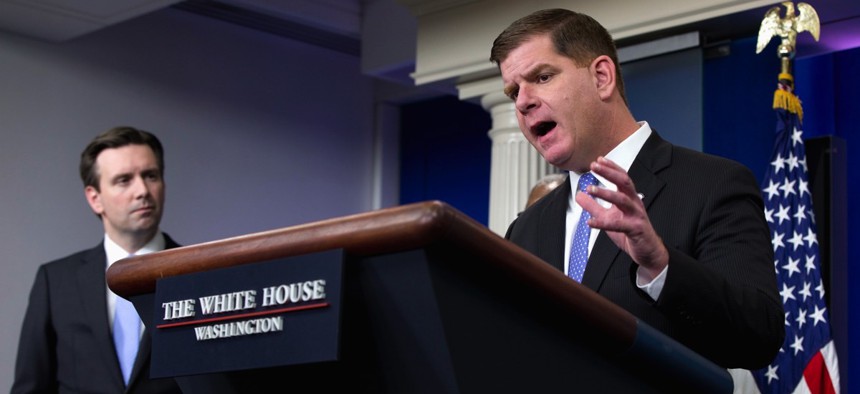Mayors Seek New Ways to Align Young Peoples’ Skills With Businesses’ Needs

Boston Mayor Martin Walsh speaks about a variety of topics affecting U.S. cities, during the daily news briefing Thursday at the White House in Washington D.C. Carolyn Kaster / AP Photo
“While we would like for each child to be on a four-year track to college, it doesn’t have to happen that way,” Fort Worth's mayor said on Thursday.
WASHINGTON — When Fort Worth Mayor Betsy Price hears from businesses that are considering whether to set up shop in the north Texas metropolis where she holds office, there are a couple of questions that commonly get asked.
“Can our current employees, that are coming with us, put their children in a school where they’re going to learn? Where they’ll have a path to a career?” is one, the mayor said. Another is: “Can you provide a workforce to serve us for the next 40 to 50 years?”
Both of those inquiries are intertwined with a panel discussion that took place here on Thursday during The United States Conference of Mayors winter meeting in the nation's capital.
Price, along with Boston Mayor Martin J. Walsh and former Kentucky Gov. Steve Beshear, took part in that discussion. It explored how education systems and other programs in the U.S. might better serve young people so that they get the skills and credentials needed to secure work in fields such as advanced manufacturing, healthcare and information technology.
From what the panelists have seen, there are decent-paying jobs out there in these sectors. But a key challenge, they said, is making sure young people who are entering the workforce have qualifications aligned with those job openings. And that’s not always easy.
How can city leaders do their part to bridge that gap?
Some of the possibilities that emerged in Thursday’s discussion included: helping local employers forge stronger relationships with families and schools and working to combat stereotypes about education programs seen as “vocational.”
“With these kids coming up, they tend to think that manufacturing is still their father’s and their grandfather’s jobs. That it’s a dirty job,” Price said. “That’s not what manufacturing is today.”
Beshear took a similar view. He advised city leaders to find ways for families, including the parents and the children, to visit local manufacturing firms to see the work they do.
“Eyes will light up,” he said. “When we take kids and families into Ford Motor Company, the manufacturing facility in Louisville, they don’t see people with hammers,” the former governor added. “They see robotics. They see people on computers.”
It’s “a great problem to have,” Beshear said, when employers have jobs they can’t fill. But at the same time, he explained, there are Kentuckians looking for work.
On Thursday, Kentucky announced that its preliminary unemployment rate ticked slightly upwards to a seasonally adjusted 5.3 percent in December, from 5 percent in November. That December figure is just above the U.S. rate for that month, which was 5 percent.
“The problem is those Kentuckians aren’t trained for those 21st century jobs that are out there today, jobs that require advanced skills, a higher level of skill, but not necessarily a four-year degree,” said Beshear, referring to the state’s residents who are out of work.
He continued by noting that when it comes to families and young people: “When you talk about what we used to call ‘vocational education,’ their eyes glaze over” and they might say, or think, “‘Oh, that’s for somebody who can’t make it in college.’”
But those days are gone, according to Beshear. The former governor said there are jobs that can be had with a one- or two-year certificate, which might pay $90,000 to $100,000 per year.
Fort Worth’s Price noted: “While we would like for each child to be on a four-year track to college, it doesn’t have to happen that way … Most of these kids need to go to work.”
The panel discussion was moderated by the mayor of West Sacramento, California, Christopher L. Cabaldon. Also taking part was a representative from the JPMorgan Chase Foundation, who detailed a new, education-related initiative the organization is backing.
The JPMorgan Chase initiative, unveiled on Tuesday, involves $75 million that will go toward programs globally over the course of five years. These will aim to reduce youth unemployment.
One of the centerpieces of the initiative is a commitment to invest in city and school programs around the world that are developing “new and effective models of high quality career-focused education,” according to an announcement issued by the banking and finance firm.
During the panel discussion on Thursday, Walsh, Boston's mayor, pointed to a number of ways his city has made strides to get young people on a track toward good careers.
There’s a summer jobs program and a life sciences initiative. And there’s also something called “Operation Exit,” which aims to connect people that have criminal backgrounds with apprenticeships in the building trades, culinary arts and technology sectors.
“Many businesses can help you in different ways,” Walsh said.
The way Price sees it, taking advantage of that sort of help and looking for other opportunities to get young people into solid jobs is crucial. She said her city has worked closely with its community college on crafting two-year programs, which provide access to certifications related to engineering, fire prevention, various healthcare professions such as nursing, and aviation—aerospace giant Lockheed Martin is a major employer in Fort Worth.
“If we don’t tackle: how do we deliver a well-prepared workforce,” she said, “then shame on us.”
Bill Lucia is a Reporter at Government Executive's Route Fifty.
NEXT STORY: Seattle’s Roadmap to 21st Century Community Policing






